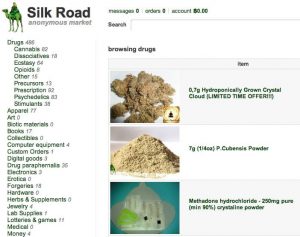This section contains spoilers

Technology plays a central role in Dope, both in the movie and behind the scenes. Moviegoers could purchase tickets to Dope with Bitcoin, a first-of-its-kind promotion that exemplifies the ties between Dope and the 21st century.[1. McDonald, Soraya Nadia. June 19, 2015. “Bitcoin, the Brat Pack and blackness: director Rick Famuyiwa talks about ‘Dope’.” The Washington Post.] Tech is also key to getting Malcolm out of trouble. When he is forced to sell the ecstasy he has been safeguarding throughout the film, Malcolm turns to the internet to move his product. With the help of their friend from band camp, Will Sherwood, played by Blake Anderson, Malcolm and his friends set up an online store on the dark web where they are able to sell the ecstasy. Their store receives further promotion when clips of their band, Awreeoh, go viral, being reposted by people taking the ecstasy they sold.
Dope received wide praise for its portrayal of drug dealing in the age of the internet. Director Rick Famuyiwa went to great lengths to make the virtual dealing as accurate as possible, from the technical jargon to the means of promotion and community created around the store. Prior to the advent of widespread internet drug dealing, ecstasy was largely sold among friends and acquaintances. In a study performed from 2003-2006, researchers Paloma Sales and Sheigla Murphy found that out of the 120 ecstasy dealers they interviewed in the San Francisco area, most were users who sold their excess supply for extra money.[2. Sales, Paloma, and Sheigla Murphy. “San Francisco’s Freelancing Ecstasy Dealers: Towards a Sociological Understanding of Drug Markets.” Journal of Drug Issues 37, no. 4 (2007): 919–49. https://doi.org/10.1177/002204260703700409.] Only 5 of these dealers viewed themselves as “high-level” dealers. Most made less that $1,000 a month, a far cry from the amount of money Malcolm makes off of his ecstasy sales in Dope.
While it is never named in Dope, the site that Malcolm uses to sell is similar to the real-life dark web site, Silk Road. Silk Road operated from 2011 to 2013 as an online marketplace for illegal products, drugs in particular.[3. Maddox, Alexia, Monica J. Barratt, Matthew Allen, and Simon Lenton. “Constructive Activism in the Dark Web: Cryptomarkets and Illicit Drugs in the Digital ‘Demimonde.’” Information, Communication & Society 19, no. 1 (2016): 111–26. https://doi.org/10.1080/1369118X.2015.1093531.] The site saw one of the first widespread uses of cryptocurrencies such as Bitcoin. Bitcoin provides a nearly untraceable way to exchange currency for product. The product would then be shipped, often through regular mail, to the purchaser. Once Silk Road gained more popularity, it was shut down, but other similar sites took its place, a cycle which has continued to today.

In the film, Malcolm and his friends build a client base through a party held by Will where his band performs. The party acts as a launch pad for their online store, and through posts on social media about both the band and the molly, which is renamed to lily because of incidents earlier in the movie, being distributed at the party, they exponentially grow their customer base. Along with each order come comments from the purchasers about how much they love lily and how great their product is. This sort of community created around drug use is something that is found on real dark web sites like Silk Road. In their piece, “Constructive Activism in the Dark Web,” authors Alexia Maddox, Monica J. Barratt, Matthew Allen and Simon Lenton examined communications on Silk Road and found that the site was much more than a place to buy drugs. They state that Silk Road acted as a “digital demimonde,” or a space where those who live on the fringes of society or those who engage in behavior seen as deviant by society can engage with one another and find community. Conversations on Silk Road would range from advice on how to take drugs safely, to which dealers were reliable, to political discussions on drug legalization and ideology.[4. Maddox, Alexia, Monica J. Barratt, Matthew Allen, and Simon Lenton. “Constructive Activism in the Dark Web: Cryptomarkets and Illicit Drugs in the Digital ‘Demimonde.’” Information, Communication & Society 19, no. 1 (2016): 111–26. https://doi.org/10.1080/1369118X.2015.1093531.] Overall, these spaces are a unique development of the 21st century, and allow groups of people to find community around an act that was previously very private. As drug use, particularly marijuana and psychedelic use, has gained more mainstream acceptance, these discussions and communities have moved away from hard-to-access dark websites to more easily accessible sites like Reddit.